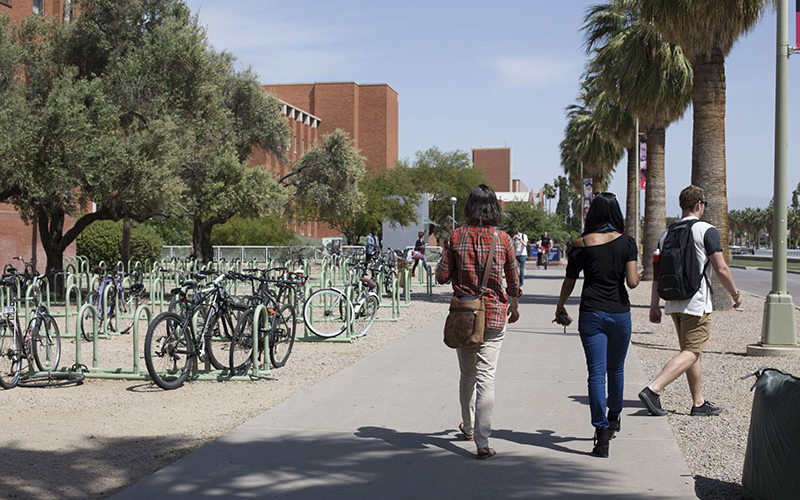
University of Arizona students walk to and from class on the Tucson campus. Universities around the U.S. are implementing new travel restrictions and possible student quarantines to minimize potential exposure to COVID-19. (File photo by Emily L. Mahoney/Cronkite News)
PHOENIX – Universities in Arizona and around the U.S. are implementing new travel restrictions and requiring some students who have been out of the country to self-quarantine to minimize danger related to COVID-19.
Some schools have halted all nonessential campus-related travel to countries with high watch level ratings as outlined by the U.S. Centers for Disease Control and Prevention.
Arizona State University President Michael Crow said in a campuswide email Thursday that although the university will not regulate personal travel, all staff and students who plan to be in countries with CDC watch ratings of 2 or 3 must follow a 14-day self-quarantine upon return.
Crow said students traveling to countries with a level 2 or 3 rating should contact ASU Health Services for additional guidance. Level 3 countries are China, Iran, Italy and South Korea; Japan is a level 2.
The CDC said Friday that 164 cases of the respiratory virus have been reported in 19 states, and 11 people have died.
ASU is one of the largest public universities in the nation, with more than 72,000 students enrolled at its metropolitan campuses. The university earlier canceled all study abroad programs in mainland China, through summer 2020.
“Travelers from level 2 or 3 countries should self-isolate at their home or an off-campus residence for 14 days and monitor their symptoms before returning to campus,” ASU’s COVID-19 webpage states.
The new guidance came as ASU students prepared to head out on spring break next week. School officials advised the community to follow updates during the break, but also said that students should not panic.
“Enjoy your spring break,” Crow said in his statement. “Follow the public health recommendations about washing your hands, staying hydrated, and getting enough rest.”
In Tucson, University of Arizona officials encouraged students and employees to have contingency plans in case they are barred from reentry to the U.S. or required to be quarantined after their break.
“Please carefully weigh the risks and benefits of any international travel,” UArizona’s campus health alerts website states.
The university also told students not to travel if they already are sick, and to avoid all nonessential travel to Hubei province or Wuhan, China, the epicenter of the COVID-19 outbreak. Officials said cleaning on campus has been accelerated.
The CDC has released guidelines to specifically help higher education institutions plan and prepare for coronavirus, and the American College Health Association has a COVID-19 task force to provide updates to its 1,100 member institutions. The group is following CDC recommendations, including one that universities “consider postponing or canceling student foreign exchange programs.”
Northern Arizona University held a campus forum to address community concerns about the virus. The conference included NAU health officials along with representatives from Coconino County Health and Human Services and Northern Arizona Healthcare.
NAU officials said they are bringing home all students from China, Italy and South Korea, and they are monitoring the international situation for new developments.
Outside Arizona, responses to the virus outbreak look similar.
The health services department of the University of Washington in Seattle has been approved to test for the novel coronavirus. The school is in King County, where 10 coronavirus related deaths have been confirmed. The university’s coronavirus information webpage said one member of the university community – a staff member who works off-campus – has been diagnosed.
New York University has canceled all nonessential international travel until further notice, and students may continue study abroad classes remotely. Three cases of COVID-19 are confirmed in New York City, where NYU’s main campus is located, and 19 are confirmed elsewhere in the state.
At the University of Wisconsin-Madison’s University Hospital, one person who’d recently traveled to China was confirmed with COVID-19. That person has recovered. The school’s informational page stresses the university’s stand against racist and xenophobic behavior stemming from misconceptions about the virus, and provides various links for reporting any problems.


